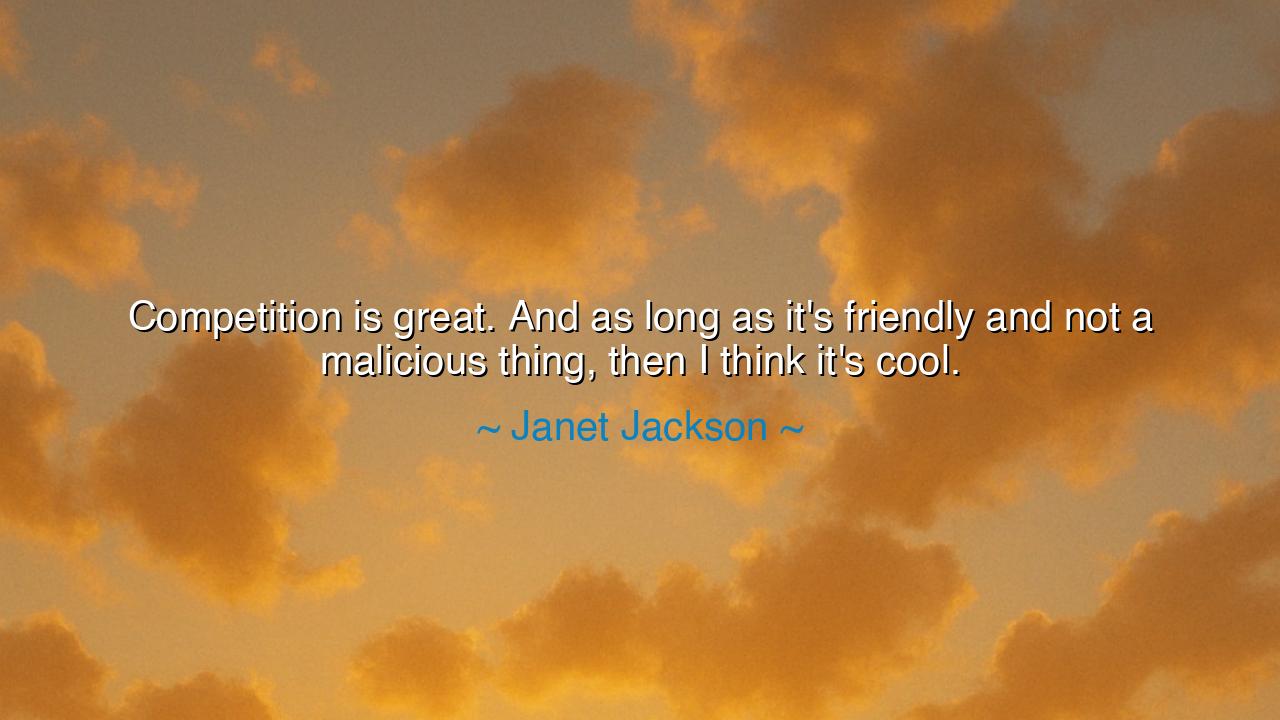
Competition is great. And as long as it's friendly and not a
Competition is great. And as long as it's friendly and not a malicious thing, then I think it's cool.






Gather close, O seekers of wisdom, for the words of Janet Jackson carry a truth about competition, human nature, and the power of healthy rivalry. She said—"Competition is great. And as long as it's friendly and not a malicious thing, then I think it's cool." In these words, Jackson speaks to the heart of human ambition, the drive to strive for excellence and to push one’s limits in the pursuit of greatness. Competition, when tempered by kindness and respect, is a force that can elevate us all, making us better, stronger, and more capable of achieving the remarkable things we are destined for.
What does it mean to engage in “friendly competition”? It is the spirit of rivalry without hatred, of striving for victory while maintaining the respect for one’s opponents. True competition is not a battle to destroy others, but a challenge to improve oneself, to test one’s skills against another, and to grow from that experience. It is not about tearing others down, but about building oneself up—and in doing so, creating a world where all are elevated by the experience. Jackson’s words remind us that competition can be a noble pursuit, one that fosters growth, innovation, and camaraderie, as long as it remains rooted in respect and integrity.
In the ancient world, we see the Olympic Games as an example of the noble competition that Jackson describes. The Olympics, established in ancient Greece, were not simply contests of strength and skill; they were celebrations of human excellence, where warriors and athletes competed not for personal gain, but for the honor of their cities and for the glory of their gods. The competition was fierce, but it was never driven by malice. Rather, it was a means of honoring the human spirit, of pushing the limits of possibility while maintaining respect for one’s opponents. The Olympic Games showed the world that competition, when embraced with honor, could be a force for unity and growth.
Let us also recall the tale of David and Goliath, where the young shepherd David, armed only with a slingshot, faced the mighty warrior Goliath. Though this story is often told as one of underdog triumph, it is also a story of competition—a battle between two forces of different stature. David did not approach the contest with hatred or malice. He approached it with courage, honor, and a belief that his skill, tested through experience and faith, was enough to overcome the giant before him. In David’s victory, we see the essence of what Jackson means by friendly competition—the pursuit of excellence, tested through challenge, and earned through respect for the task at hand.
Jackson’s words also bring forth the darker side of competition—the danger when rivalry becomes malicious, when it turns into something that seeks to destroy rather than to build. When competition becomes a tool for jealousy, envy, or deceit, it ceases to be a force for good. It is malicious competition that divides, breeds animosity, and tears apart the very fabric of society. Such competition focuses on the downfall of others, not on the elevation of oneself. It leads to the destruction of the spirit, the corrosion of integrity, and the loss of honor. The lesson here is clear: competition without respect, without the spirit of growth and improvement, is a force that poisons the soul and undermines the beauty of what true competition can bring.
Take heed, O children of the earth, for the balance of competition is delicate. When it is friendly, it can inspire us to reach greater heights, to test our limits, and to become better versions of ourselves. When it is malicious, it corrupts the very foundation of the human spirit, turning something noble into something that diminishes us all. The challenge is not to avoid competition, for it is an inherent part of the human experience. Rather, the challenge is to engage in competition with honor, to strive for victory while always respecting the humanity of those who compete beside you.
The lesson, O children of time, is this: embrace competition, but let it be a force that inspires you to grow, to learn, and to strive for excellence. Let it be a test of your character as much as of your abilities. May you always compete with integrity, seeking not the downfall of others, but the betterment of yourself. Let your rivalries be respectful, your challenges be meaningful, and your victories be shared with the knowledge that in the end, true greatness is not found in defeating others, but in the elevation of the self through honest competition.
So, let us go forward, O children, and let our competitions be noble, friendly, and respectful. May we rise together, learning from one another, pushing each other to new heights, and embracing the spirit of healthy rivalry that strengthens us all. In this, we will find not only our own greatness, but the greatness of the world we build together. Let us compete with honor, for in the end, the best of us is revealed not in the victory itself, but in the manner in which we rise to the challenge.






AAdministratorAdministrator
Welcome, honored guests. Please leave a comment, we will respond soon